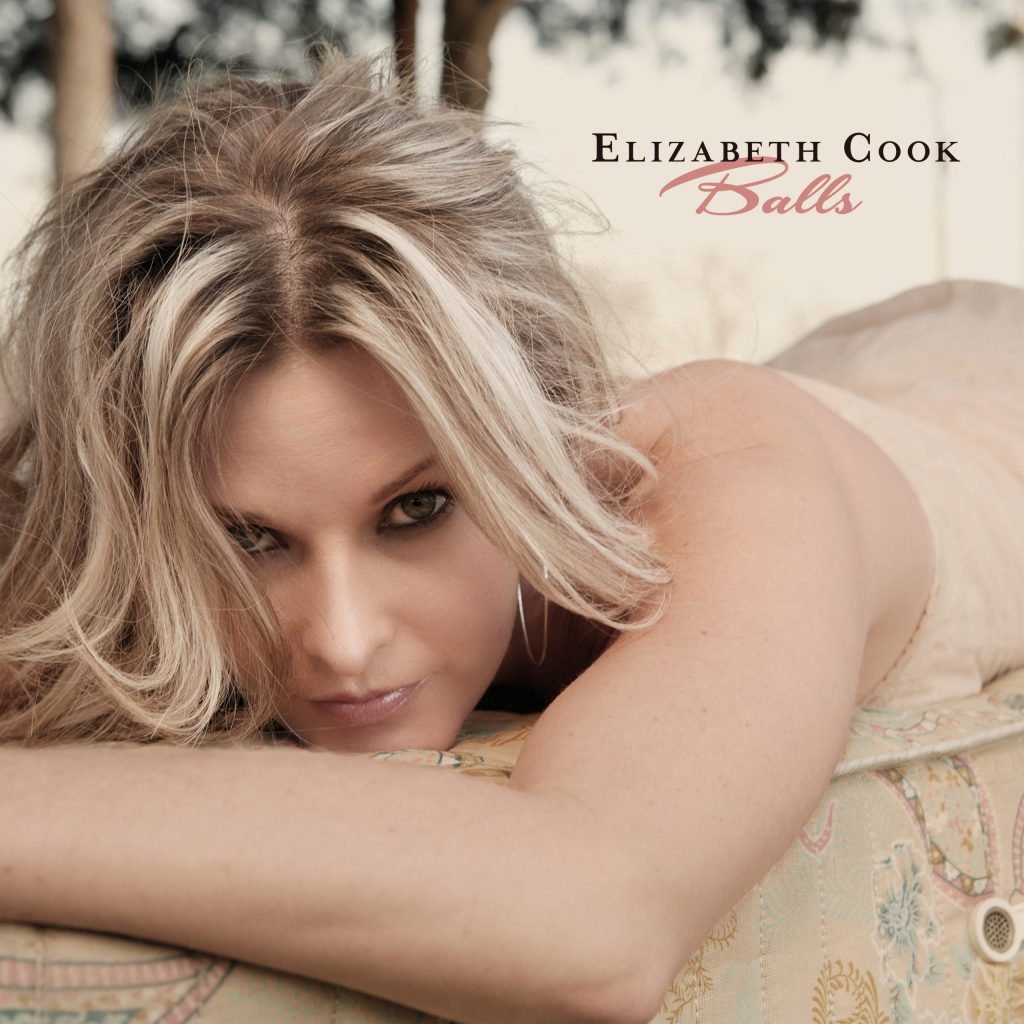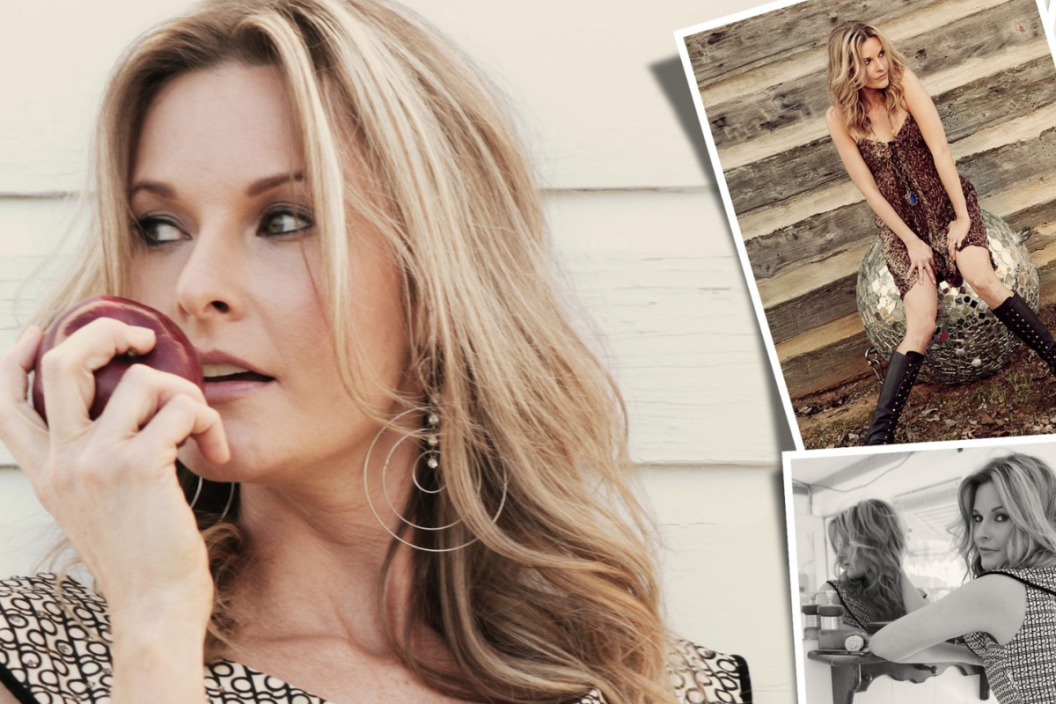Shortly after her song "Sometimes It Takes Balls to Be a Woman" was banned from country radio, Elizabeth Cook found herself seated next to Loretta Lynn. Inside the Grand Ole Opry House, a place where, coincidentally, Cook also wasn't allowed to play her fan favorite song about sexism and gender roles, the pair's conversation turned to banned songs — something Lynn knows all too well.
"It was just me and her, left alone to chat with no one else's ears on our conversation. In those types of moments with somebody that's lived the life that she's lived are absolutely priceless," Cooks tells Wide Open Country. "She asked me 'Well, what's going on with you?' And I told her that I had a new song and that I was not allowed to sing it on the Opry and that it had been banned by country radio. And she said 'Honey, I had 9 songs banned by country radio.' She knew the exact count. So I was like 'Oh, and you're Loretta Lynn. So maybe I will be okay in the end.'"
As usual, Loretta was right; Cook had no need to worry. "Balls," which Cook wrote with Australian country artist Melinda Schneider, proved to be a turning point for the Florida-native.
Just a few years after the release of her second studio album Hey Y'all, the country singer was selling shoes in a "fancy ladies' department store" in Nashville and becoming increasingly disillusioned with the music business.
"I had been to the top of the mountain with Music Row. I had major labels record deals, huge publishing deals and fallen to the valley," Cook says. "There was just a complete mismatch of artistic vision there."
But it wasn't for lack of trying.
"I was a young southern woman, groomed to be polite and kind with a work ethic to please your boss when you're getting paid to do something. So I did want to fit in desperately. I did want to please them. I just couldn't," she says. "I didn't have that gene that was able to basically manipulate my creative process into something that would work for them. I feel like the manipulative spirit of media in general kicked in, from the news to music — it became about branding and selling products and advertisement around songs. They wanted no music to disrupt anyone enough to change a channel so that they might miss the truck ad that came on next...that just wasn't art to me.
I got in it to make music that I loved and that would excite people and myself and to be honest and true. I felt like that's what country music is. Distilled down to one word — I think Hank Williams called it 'earnest.' It's not about twang, the instrumentation. It's about being earnest. Without that, there was nothing to me. I didn't have it in me. It wasn't even a choice. I couldn't make it if I tried. And I kind of did try and I was just awful at it. Just awful. [Laughs]"
"Sometimes It Takes Balls to Be a Woman," a whip-smart take-down of misogyny that would make Loretta proud, caught the attention of Cook's heroes, such as Nanci Griffith, who invited Cook to tour with her, and Rodney Crowell, who produced Cook's 2007 album Balls.
For the album's 15th anniversary, Cook, who's since released the albums Welder, Gospel Plow, Exodus of Venus and Aftermath, reissued the career-defining record.
"One of the most affirming and validating things about reissuing this album is listening back to that and where I am now and that that girl is still in me," Cook says. "Against the forces of cynicism and becoming jaded because of the knocks and being a being a woman and being independent and being in country music and every single thing that you can have — losing my family, losing my marriage, losing our farm, everything that comes against you, I've been able to — through music — persist."
Below, Cook gives us a song-by-song guide to the album that changed her life.

Courtesy of artist
This interview has been edited for length and clarity.
"Times Are Tough in Rock N' Roll"
Album opener "Times Are Tough in Rock N' Roll" features a timely line: All my feelings, all my fears/ Were confirmed with Britney Spears. What was originally a reference to female artists and sexual agency took on yet another meaning in the wake of recent revelations about Britney Spears' conservatorship.
"Having come under the thumb of some more powerful people at a vulnerable moment and losing sort of my power over myself, that was something that I also could relate to in an even more profound way," Cook says.
"Don't Go Borrowin' Trouble"
"My husband at the time as well as my mother tended to have experiences in their life that made them a little bit pessimistic or downer on things. I was more like with my daddy, who was the go-getter and the glass was always half-full, even if it's half-full of piss [Laughs] We stay positive and keep a positive energy around things. [Don't Go Borrowin' Trouble'] is about that."
"Sometimes it Takes Balls to Be a Woman"
"[Melinda Schneider], who's a big country star in Australia, she saw me on the Opry — the Opry was still having me on — and she wanted to write. So we got together and she was lamenting to me about her problems with her record company and her husband who ran the record company and everything you can imagine that comes with that. And I just said her 'Melinda, sometimes it takes balls to be a woman' and we wrote the song in like 30 minutes."
The song led to Cook being championed by Nanci Griffith.
"I think I did something at the Country Music Hall of Fame and Nanci Griffith heard me. The response to the song was just huge when I did it live. Nanci heard it and she was like 'you gotta come on tour with me.' She started yelling about me to everybody that would listen and that led to the opportunity for me to make a record...I wrote like a mad woman to write enough songs to have an album around that song...It was by hook or by crook. [Laughs] It was a scrappy time."
Despite being a crowd favorite at live shows, the song was banned on country radio, which Cook says wasn't terribly surprising.
"I was pretty disgusted by what I had seen around country radio in terms of the payola, the misogynistic culture, particularly where women artists were concerned. It was a pretty gross business that was going on there that I have witnessed. So from that aspect, it wasn't surprising," Cook says. "But I couldn't reconcile that with the audience reaction. I played that song in front of country music fans and they would go berserk and hoot and holler and laugh and buy the t-shirt and everything and when country radio wouldn't then bring it to them, that made no sense to me."
"Rest Your Weary Mind"
Another tune co-written with Melinda Schneider, "Rest Your Weary Mind" features singer-songwriter and Guided By Voices member Bobby Bare Jr.
"I wanted a voice that kind of juxtaposed with the tenderness that I was going to say. [Bobby Bare Jr.] has got that rock voice and road-weary type voice. So he was just the perfect choice for 'Rest Your Weary Mind.'"
"He Got No Heart"
"I had two particularly close girlfriends at that time that were both married to men that they're both now divorced from. [They were] doing what girlfriends do, getting on the phone and complaining about what's going on at home, complaining about your husband. So ['He Got No Heart'] was inspired by some of the situations my girlfriends were in."
"Mama's Prayers"
"I had gone out to be with [my mom] at the farm. They had a farm about an hour east Nashville with a little trailer on it. I'd go out there on the weekends whenever I could. I had gone out there on Mother's Day weekend to spend time her. I had come off the road and didn't have time to get anything together to give to her...I decided that I would write her a song. And it was something that she always said to all of us. She said 'I pray for every one of y'all every night.' And I think as a poor Appalachian single mom, that's kind of all she could felt she could do. So I just wanted to reflect on that and let her know that she was heard and that I was grateful for it, even though I wasn't actively religious.
So I wrote the song out and I printed it out on card stock paper....I found a tub of photos with an 8 x 10 frame that had like a prom picture in it or something. I took it out and put the paper in the frame and I set it on the kitchen counter so she'd see it when she got up in the morning. So that was my gift to her. And then when she passed and we sold the farm, I took it down and it hangs in my office now."
"Sunday Morning"
"I had heard ['Sunday Morning'] while hanging around cool people and my husband at the time was a rocker and he exposed me to a lot of great music and Velvet Underground was among that. I thought it was such a whimsical, beautiful melody."
"What Do I Do"
"Probably my starkest memory around ['What Do I Do'] is when I was in the studio cutting it...Rodney came over to talk back into the headphones...Rodney was producing...he said [that line] doesn't really make a lot of sense to me. And I said 'Well, I sort of wrote all that in a stream of onsciousness that I trust and I don't wanna mess with it.' And he was the little taken aback. He was like, 'oh, so in other words, 'no.'' [Laughs] Because I don't doubt my muse..and I will stand up for her."
Cook says working with Crowell was both incredible and intimidating.
"He's a self professed patriarch...I'm always offering to be another one [of his daughters] if he would consider adopting because he's just a wise, sage father figure... for me to have his guidance, his guiding hand artistically and musically was just invaluable because of who he is and the success that he's had and the art that he has made and the poetry that he has made. I was in really, really good hands and I knew it."
"Down Girl"
"['Down Girl'] is my favorite song on the album....it was another one, like 'He Got No Heart.' So for my two very close girlfriends in that moment of going through sort of what was clearly her marriage was coming to a close. I was inspired by her and how she felt and what she was going through. And it was really cool to have Nanci — Nanci really wanted to sing on that one. To have Nanci and Rodney sing on it, that was awesome."
"Gonna Be"
Cook says "Gonna Be" became a rallying cry of sorts. The song celebrated where she had been and where she was headed and served as an affirmation that she wasn't going to quit.
"I had enough influential people that believed in me, between the Opry and folks like Nanci Griffith and Rodney Croweell and Guy Clark, and enough industry support and musical community support that I wasn't going anywhere," she says. "So I was emboldened to write that song that I would not go away."
"Always Tomorrow"
"['Always Tomorrow'] was written by Tim Carroll, who was my husband at the time. And I just thought it was a beautiful song, a lot like 'Sunday Morning,' it just had this whimsical, melancholy feeling, but with a little dash of hope. It had this sort of lullaby melody that I love to sing. It's a beautiful song to sing and to record and [it's] how I wanted to end the album."




